|
|
|
Sort Order |
|
|
|
Items / Page
|
|
|
|
|
|
|
| Srl | Item |
| 1 |
ID:
193483
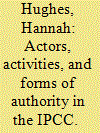

|
|
|
|
|
| Summary/Abstract |
Scholarship on global environmental assessments call for these organisations to become more reflexive to address challenges around participation, inclusivity of perspectives, and responsivity to the policy domains they inform. However, there has been less call for reflexivity in IPCC scholarship or closer examination of how routine concepts condition scholarly understanding by focusing on science and politics over other social dynamics. In this article, I suggest that scholarly reflexivity could advance new analytical approaches that provide practical insights for changing organisational structures. Through reflecting on my understanding of the IPCC, I develop actors, activities, and forms of authority as a new analytical framework for studying international organisations and knowledge bodies. Through its application, I describe the social order of the IPCC within and between the panel, the bureau, the technical support units, the secretariat and the authors, which is revealing of which actors, on the basis of what authority, have symbolic power over the writing of climate change. The fine-grained analysis of organisations enabled by this analytical framework reveals how dominance can and is being remade through intergovernmental relations and potentially, identifies avenues that managers of these bodies can pursue to challenge it.
|
|
|
|
|
|
|
|
|
|
|
|
|
|
|
|
| 2 |
ID:
111751
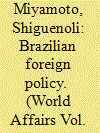

|
|
|
| 3 |
ID:
180648
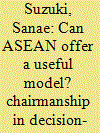

|
|
|
|
|
| Summary/Abstract |
ASEAN has adopted decision-making by consensus. Taking ASEAN as a case study, this article aims to explain how competing positions are reconciled and international agreements reached in organisations that have adopted consensus, a process that risks non-agreement because each participant has veto power, as their sole decision-making rule. ASEAN roundtables with the foreign ministers of its member states have indeed generated some meaningful agreements. I argue that rules and customs associated with ASEAN chairmanship effectively comprise a reconciliation mechanism. The chair is empowered to play an agenda-setting role, and the combination of rotating chairmanship and a limited number of member states means that every state will enjoy the strong power, within a reasonably short period of time. Since each state knows that its turn will come soon, all are willing to allow the others to exert the power of the chair and guide consensus toward agreements that are consistent with the chair’s national interests. This article analyses the impact of a strong ASEAN chair via empirical case studies of decisions reached (or not) under consensus regarding issues where member states had conflicting interests. This analysis of ASEAN decision-making contributes to the ongoing debate on effectiveness of ASEAN and has theoretical implications for the understanding of international organisations that operate under similar institutional settings.
|
|
|
|
|
|
|
|
|
|
|
|
|
|
|
|
| 4 |
ID:
171922
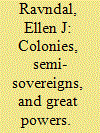

|
|
|
|
|
| Summary/Abstract |
How did the transition from a world of empire to a global international system organised around the sovereign state play out? This article traces the transition over the past two centuries through an examination of membership debates in two prominent intergovernmental organisations (IGOs). IGOs are sites of contestation that play a role in the constitution of the international system. Discussions within IGOs reflect and shape broader international norms, and are one mechanism through which the international system determines questions of membership and attendant rights and obligations. The article reveals that IGO membership policies during this period reflected different compromises between the three competing principles of great power privilege, the ‘standard of civilisation’, and universal sovereign equality. The article contributes to Global IR as it confirms that non-Western agency was crucial in bringing about this transition. States in Africa, Asia, and Latin America championed the adoption of the sovereignty criterion. In this, paradoxically, one of the core constitutional norms of the ‘European’ international system – the principle of sovereign equality – was realised at the hands of non-European actors.
|
|
|
|
|
|
|
|
|
|
|
|
|
|
|
|
| 5 |
ID:
108649
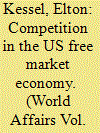

|
|
|
|
|
| Publication |
2011.
|
| Summary/Abstract |
Elton Kessel describes the role of competition in a free market economy, contrasting its place in the financial sector as financial firms move from a monopoly position in initiating innovative financial procedures to an oligopolistic position as competitors adopt the same procedures. The motivation is abnormal profits. Enormous profits among a relatively small number of firms have led to political power making it unlikely for states or international organisations to secure legislative control of these firms.
|
|
|
|
|
|
|
|
|
|
|
|
|
|
|
|
| 6 |
ID:
167180
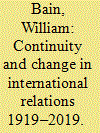

|
|
|
|
|
| Summary/Abstract |
This article reflects on themes of continuity and change over the past century of international relations. In 1919 the victors of the First World War endeavoured to remake international relations by abolishing war and erecting institutional structures that were intended to promote a more just world order. The achievements and failures of this project can be discerned in overlapping patterns of continuity and change that portray a world that is at once old and new. The discourse of change tends to dominate thinking about international relations. Technological innovation, globalisation, and human rights, among other factors, cultivate the progressive ‘one-worldism’ of an interconnected global community of nations and peoples. But, evidence of change notwithstanding, much of contemporary international relations would be intelligible to persons who lived a century ago. International relations is still fundamentally about order and security, power and restraint, and freedom and equality. These patterns provide an important reminder that progress is possible but that international relations involves an open-ended project of continuous renovation and conservation.
|
|
|
|
|
|
|
|
|
|
|
|
|
|
|
|
| 7 |
ID:
050983
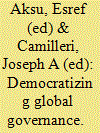

|
|
|
|
|
| Publication |
Hampshire, Palgrave Macmillan, 2002.
|
| Description |
xix, 306p.
|
| Standard Number |
033397123X
|
|
|
|
|
|
|
|
|
|
|
|
Copies: C:1/I:0,R:0,Q:0
Circulation
| Accession# | Call# | Current Location | Status | Policy | Location |
| 047942 | 327/AKS 047942 | Main | On Shelf | General | |
|
|
|
|
| 8 |
ID:
164541
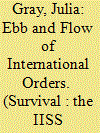

|
|
|
|
|
| Summary/Abstract |
For every successful international organisation, many others died out or never got off the ground.
|
|
|
|
|
|
|
|
|
|
|
|
|
|
|
|
| 9 |
ID:
141055
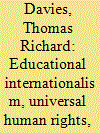

|
|
|
|
|
| Summary/Abstract |
Robert Owen, the early nineteenth-century social reformer, made a greatly more significant contribution to the theory and practice of International Relations than has hitherto been assumed. This article shows how Owen helped to develop an understudied but distinctive form of internationalist thought focusing on the role of education in the pursuit of peace. Owen's previously neglected contributions to human rights norms and to international organisation are also explored, including his promotion of universal rather than nationally-oriented human rights standards, his role in the nascent movement towards the formation of international non-governmental organisations, and his contribution to international federalist ideas. Following an introduction to Owen's place in the literature, this article discusses each of these contributions of Owen to the theory and practice of International Relations in turn. The analysis reveals that Owen's contributions in each of these aspects are as significant for their limitations as for their insights
|
|
|
|
|
|
|
|
|
|
|
|
|
|
|
|
| 10 |
ID:
185161
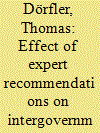

|
|
|
|
|
| Summary/Abstract |
The article explores whether and to what extent expert recommendations affect decision-making within the Security Council and its North Korea and Iran sanctions regimes. The article first develops a rationalist theoretical argument to show why making many second-stage decisions, such as determining lists of items under export restrictions, subjects Security Council members to repeating coordination situations. Expert recommendations may provide focal point solutions to coordination problems, even when interests diverge and preferences remain stable. Empirically, the article first explores whether expert recommendations affected decision-making on commodity sanctions imposed on North Korea. Council members heavily relied on recommended export trigger lists as focal points, solving a divisive conflict among great powers. Second, the article explores whether expert recommendations affected the designation of sanctions violators in the Iran sanctions regime. Council members designated individuals and entities following expert recommendations as focal points, despite conflicting interests among great powers. The article concludes that expert recommendations are an additional means of influence in Security Council decision-making and seem relevant for second-stage decision-making among great powers in other international organisations.
|
|
|
|
|
|
|
|
|
|
|
|
|
|
|
|
| 11 |
ID:
122013
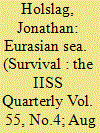

|
|
|
|
|
| Publication |
2013.
|
| Summary/Abstract |
Maritime disputes in Eastern Asia have been sending odd ripples of excitement through Western Europe for the past few years. Experts and policymakers claim that Europe cannot stay aloof. Some speculate that China might cut off trade routes in the event of a conflict and that Europe needs to collaborate with the United States to keep them open. A few go so far as to say that Europe's credibility as a security actor hinges upon the ability to send gunboats to the Pacific, and that it should build on the grand maritime tradition of member states such as the United Kingdom. Others assume that the European model of regional integration could be a way of settling the wrangling over the South China Sea. Maritime disputes in the East are, to be sure, a source of much uncertainty, and could escalate. But is this a reason for Europe to dive into the play pool of the Pacific powers?
|
|
|
|
|
|
|
|
|
|
|
|
|
|
|
|
| 12 |
ID:
141213
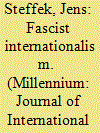

|
|
|
|
|
| Summary/Abstract |
In 1934, the Italian diplomat and scholar Giuseppe de Michelis (1872−1951) published a programmatic book that in English was called ‘World Reorganisation on Corporative Lines’. In this study, de Michelis suggested transferring the socio-economic model of fascist Italy to the global level. He thus envisaged global economic governance by a powerful international organisation and a strict limitation of national sovereignty over the factors of production. My purpose in this article is to explore these largely forgotten proposals as well as the ideological context from which they emerged. The fascist internationalism of de Michelis was technocratic and dirigist, enthusiastic about the possibilities of public planning and the virtues of bureaucratic organisation. This is why his suggestions resembled, in some important respects, world order proposals made by liberal internationalists during the same period. The lesson for International Relations theory is that blueprints for international institutions can be connected to a wide variety of political ideologies. There is no reason to believe that any tradition of political thought is necessarily and eternally committed to internationalism, while others are principally hostile to it.
|
|
|
|
|
|
|
|
|
|
|
|
|
|
|
|
| 13 |
ID:
120488
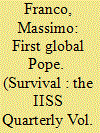

|
|
|
|
|
| Publication |
2013.
|
| Summary/Abstract |
Francis I represents an important shift from the eurocentrism of his predecessors. Even as he rebuilds the Church through renewed attention to poverty and inclusion, however, the real changes will be in Rome.
|
|
|
|
|
|
|
|
|
|
|
|
|
|
|
|
| 14 |
ID:
046667
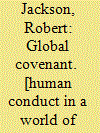

|
|
|
|
|
| Publication |
Oxford, Oxford University Press, 2000.
|
| Description |
xii, 464p.
|
| Standard Number |
0198296258
|
|
|
|
|
|
|
|
|
|
|
|
Copies: C:1/I:0,R:0,Q:0
Circulation
| Accession# | Call# | Current Location | Status | Policy | Location |
| 045843 | 327.101/JAC 045843 | Main | On Shelf | General | |
|
|
|
|
| 15 |
ID:
054111
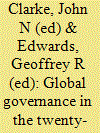

|
|
|
|
|
| Publication |
Hampshire, Palgrave Macmillan, 2004.
|
| Description |
xi, 295p.
|
| Series |
Global issues
|
| Standard Number |
033380256X
|
|
|
|
|
|
|
|
|
|
|
|
Copies: C:1/I:0,R:0,Q:0
Circulation
| Accession# | Call# | Current Location | Status | Policy | Location |
| 048688 | 341.2/CLA 048688 | Main | On Shelf | General | |
|
|
|
|
| 16 |
ID:
141207
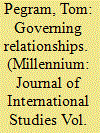

|
|
|
|
|
| Summary/Abstract |
The global human rights regime has undergone extraordinary expansion in the last thirty years. It is particularly notable for its profusion of state and non-state actors and levels of formal articulation. This article seeks to make legible the human rights governance architecture from the global to the local level, within an issue-specific domain. Orchestration theory is employed as a general mode of governance, with application across political units and political levels. Orchestration applies when a focal actor enlists and supports third-party actors to address the target indirectly in pursuit of shared governance objectives. Using the UN Optional Protocol to the Convention Against Torture (OPCAT) as an example, the article explores the authority relationship across two central political units (the orchestrator and intermediary), with a focus on how this new global human rights architecture may offer a way of bridging the steps separating international instruments from practices on the ground.
|
|
|
|
|
|
|
|
|
|
|
|
|
|
|
|
| 17 |
ID:
121238
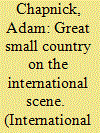

|
|
|
|
|
| Publication |
2012.
|
| Summary/Abstract |
In 1952, the Carnegie Endowment for International Peace thought it
worthwhile to commission a series of national studies on the United Nations
(UN). In Canada, the task was taken on by Fred Soward, an academic and
former special assistant in the Department of External Affairs, and Edgar
McInnis, president of the Canadian Institute of International Affairs and a
delegate to the 1952 UN General Assembly.1
Four years later, Canada and the
United Nations was released to uniformly positive reviews.2
|
|
|
|
|
|
|
|
|
|
|
|
|
|
|
|
| 18 |
ID:
033300
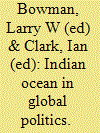

|
|
|
|
|
| Publication |
Boulder, Westview Press, 1982.
|
| Description |
xi, 260p.
|
| Series |
Westview's special studies in International relations
|
| Standard Number |
0865310386
|
|
|
|
|
|
|
|
|
|
|
|
Copies: C:1/I:0,R:0,Q:0
Circulation
| Accession# | Call# | Current Location | Status | Policy | Location |
| 021508 | 327.1824/BOW 021508 | Main | On Shelf | General | |
|
|
|
|
| 19 |
ID:
121097
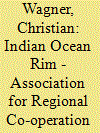

|
|
|
|
|
| Publication |
2013.
|
| Summary/Abstract |
The Indian Ocean has received new attention in recent years because of its economic and strategic importance. The region is seen as a theatre for great power rivalries mainly between the United States, China, and India. In contrast to this, the Indian Ocean Rim - Association for Regional Co-operation (IOR-ARC) has hardly attained any political importance more than 15 years after its inauguration. The economic and political divergences among its 20 members and the competition with (sub-)regional organisations have limited its impact. The futile quest for regionalism should be replaced by a new understanding of the IOR-ARC as an international or inter-regional organisation that deals with different maritime issues. This would pave the way to promote closer cooperation between the different regional organisations and to enter into meaningful collaboration with the international community in order to fight common threats.
|
|
|
|
|
|
|
|
|
|
|
|
|
|
|
|
| 20 |
ID:
168868
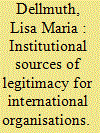

|
|
|
|
|
| Summary/Abstract |
This article addresses a significant gap in the literature on legitimacy in global governance, exploring whether, in what ways, and to what extent institutional qualities of international organisations (IOs) matter for popular legitimacy beliefs towards these bodies. The study assesses the causal significance of procedure and performance as sources of legitimacy, unpacks these dimensions into specific institutional qualities, and offers a comparative analysis across IOs in three issue areas of global governance. Theoretically, the article disaggregates institutional sources of legitimacy to consider democratic, technocratic, and fair qualities of procedure and performance. Empirically, it examines the effects of these institutional qualities through a population-based survey experiment in four countries in different world regions with respect to IOs in economic, security, and climate governance. The findings demonstrate that both procedure- and performance-related aspects of IO policymaking matter for popular legitimacy beliefs. This result holds across democratic, technocratic, and fair qualities of IO procedure and performance. Disaggregating the results by issue area indicates that a broader scope of institutional qualities are important for legitimacy beliefs in economic governance compared to security governance and, especially, climate governance. These findings suggest that propositions to reduce the institutional sources of IO legitimacy to single specific qualities would be misguided.
|
|
|
|
|
|
|
|
|
|
|
|
|
|
|
|
|
|
|
|
|